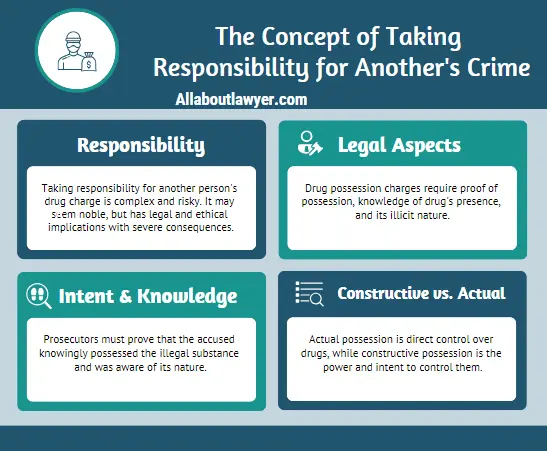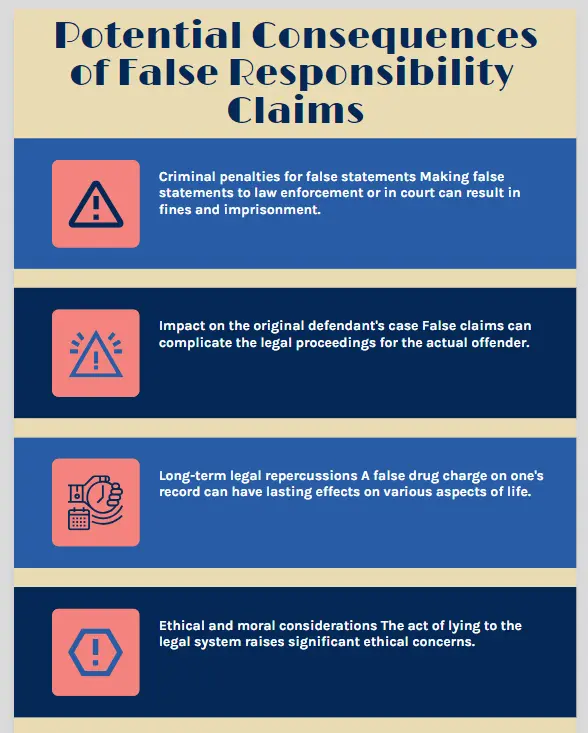Can Someone Else Take Responsibility for a Drug Charge?
Drug charges are serious legal matters that can have long-lasting consequences for individuals. These charges typically involve the possession, distribution, or manufacture of illegal substances. Legal responsibility in drug cases is determined based on various factors, including possession, intent, and knowledge. So in this article we will discuss Can Someone Else Take Responsibility for a Drug Charge.
Table of Contents
The Concept of Taking Responsibility for Another’s Crime
The idea of someone taking responsibility for another person’s drug charge is a complex and potentially dangerous situation. While it may seem like a noble act to protect someone else, it carries significant legal and ethical implications that can have severe consequences for all parties involved.
II. Legal Aspects of Drug Charges
A. Elements of drug possession charges
Drug possession charges typically require proof of:
1. Actual or constructive possession of a controlled substance
2. Knowledge of the drug’s presence
3. Knowledge of the drug’s illicit nature
B. Intent and knowledge in drug cases
Prosecutors must prove that the accused knowingly possessed the illegal substance and was aware of its nature.
C. Constructive possession vs. actual possession
Actual possession refers to having direct physical control over the drugs, while constructive possession involves having the power and intent to control the drugs, even if not physically holding them.

The Legality of Taking Responsibility for Another’s Drug Charge
A. False confession laws
Many jurisdictions have laws against making false statements to law enforcement or in court proceedings. False confessions can be prosecuted as separate crimes.
B. Obstruction of justice
Taking responsibility for another’s crime can be considered obstruction of justice, which is a serious offense.
C. Perjury and its consequences
If the false admission is made under oath, it constitutes perjury, which carries severe penalties.
D. Accomplice liability
By claiming responsibility, one might inadvertently implicate themselves as an accomplice to the crime.
Motivations for Taking Responsibility for Another’s Drug Charge
A. Protecting family members or friends
Some may feel compelled to shield loved ones from legal consequences.
B. Coercion or threats
In some cases, individuals may be pressured or threatened to take the blame.
C. Financial incentives
There might be monetary motivation to assume responsibility for another’s crime.
D. Misguided loyalty
A sense of loyalty or obligation might drive someone to falsely claim responsibility.
V. Potential Consequences of False Responsibility Claims

A. Criminal penalties for false statements
Making false statements to law enforcement or in court can result in fines and imprisonment.
B. Impact on the original defendant’s case
False claims can complicate the legal proceedings for the actual offender.
C. Long-term legal repercussions
A false drug charge on one’s record can have lasting effects on various aspects of life.
D. Ethical and moral considerations
The act of lying to the legal system raises significant ethical concerns.
VI. Legal Defenses in Drug Possession Cases
A. Lack of knowledge
Defendants may argue they were unaware of the drugs’ presence or nature.
B. Unwitting possession
One might claim they unknowingly came into possession of the drugs.
C. Entrapment
In some cases, defendants may argue they were induced by law enforcement to commit the crime.
D. Fourth Amendment violations
Evidence obtained through illegal searches or seizures may be suppressed.
The Role of Law Enforcement and Prosecutors
A. Investigation techniques in drug cases
Law enforcement uses various methods to determine true possession and responsibility.
B. Prosecutorial discretion
Prosecutors have some leeway in deciding whether to pursue charges and against whom.
C. Plea bargaining and cooperation agreements
These agreements can influence how cases are resolved and who is ultimately held responsible.
D. Witness credibility assessment
Prosecutors and law enforcement evaluate the credibility of statements and confessions.
Ethical Considerations for Attorneys
A. Professional responsibility rules
Attorneys are bound by ethical rules that prohibit knowingly presenting false information to the court.
B. Duty to the court vs. duty to the client
Lawyers must balance their obligations to their clients with their duty to the legal system.
C. Handling client confessions
Attorneys must navigate complex ethical scenarios when clients admit to crimes or false confessions.
D. Withdrawing from representation
In some cases, attorneys may need to withdraw if they become aware of false claims.
Impact on the Criminal Justice System
A. False convictions and wrongful imprisonment
False responsibility claims can lead to unjust outcomes and erode trust in the system.
B. Resource allocation in investigations
False claims can waste valuable law enforcement and court resources.
C. Public trust in the legal system
Integrity of the justice system relies on truthful testimony and accurate accountability.
D. Deterrence effect on future crimes
False claims may undermine the deterrent effect of criminal laws.
Alternatives to Taking False Responsibility
A. Legal defense strategies
Exploring legitimate defense options with a qualified attorney is crucial.
B. Cooperation with law enforcement
In some cases, cooperating with authorities may lead to more favorable outcomes.
C. Drug diversion programs
Many jurisdictions offer alternative programs for drug offenders.
D. Rehabilitation and treatment options
Addressing underlying substance abuse issues can be a constructive approach.
Psychological and Social Factors
A. Group dynamics and peer pressure
Understanding how social influences can lead to false admissions.
B. Family loyalty and protection instincts
Exploring the psychological drives behind protecting loved ones.
C. Understanding the psychology of false confessions
Examining why people sometimes falsely confess to crimes they didn’t commit.
D. Social consequences of taking false responsibility
Considering the impact on relationships and social standing.
Long-term Implications
A. Criminal record and background checks
A drug conviction, even a false one, can appear on background checks.
B. Employment and educational opportunities
Drug convictions can limit job prospects and educational access.
C. Personal relationships and trust issues
False admissions can strain relationships and erode trust.
D. Mental health and guilt
The psychological toll of maintaining a false confession can be significant.
Conclusion
In conclusion, taking responsibility for someone else’s drug charge is a serious legal and ethical misstep with far-reaching consequences. It undermines the integrity of the justice system, potentially leading to wrongful convictions and eroding public trust. Instead of resorting to false confessions, individuals facing drug charges should seek qualified legal counsel, explore legitimate defense strategies, and consider alternative programs or treatment options when available.
By maintaining honesty and integrity in legal matters, we not only protect ourselves from severe personal and legal repercussions but also contribute to a fair and just society. Ultimately, the path of truth, coupled with proper legal guidance, offers the best chance for a positive resolution in drug-related cases.
FAQs
A. Can I legally take the blame for someone else’s drug possession?
No, it is illegal to falsely claim responsibility for another person’s crime.
B. What are the penalties for falsely confessing to a drug charge?
Penalties can include fines, imprisonment, and a permanent criminal record.
C. How do prosecutors determine the true owner of drugs in a shared space?
Prosecutors consider various factors, including proximity, control over the area, and witness statements.
D. Can I retract a false confession to a drug charge?
While possible, retracting a false confession can be complicated and may lead to additional legal issues.
E. What should I do if I’m pressured to take responsibility for someone else’s drug charge?
Seek immediate legal counsel and do not make any statements to law enforcement without an attorney present.
Visit All About Lawyer for more such articles
About the Author

Sarah Klein, JD, is a former criminal defense attorney with hands-on experience in cases involving DUIs, petty theft, assault, and false accusations. Through All About Lawyer, she now helps readers understand their legal rights, the criminal justice process, and how to protect themselves when facing charges.
Read more about Sarah
